
EUROPEAN JOURNAL OF WILDLIFE RESEARCH
Scope & Guideline
Championing the dialogue between ecology and policy.
Introduction
Aims and Scopes
- Wildlife Ecology and Behavior:
Research examining the ecological dynamics of wildlife species, including their behavior, population dynamics, and interactions with their environment. - Conservation Biology:
Studies aimed at understanding the threats to wildlife and developing strategies for their conservation, including habitat management and species recovery efforts. - Human-Wildlife Interactions:
Investigations into the impacts of human activities on wildlife populations and the resulting conflicts, such as human-wildlife conflict mitigation and management. - Invasive Species Management:
Research on the impacts of invasive species on native wildlife and ecosystems, including studies on control measures and ecological consequences of invasions. - Wildlife Disease and Health:
Studies focusing on the health of wildlife populations, including disease prevalence, pathogen transmission, and the impact of environmental factors on wildlife health. - Methodological Advancements:
Innovative research methodologies for wildlife monitoring, population estimation, and ecological studies, enhancing the precision and reliability of wildlife research.
Trending and Emerging
- Climate Change Impacts on Wildlife:
Research addressing the effects of climate change on wildlife behavior, distribution, and conservation strategies is increasingly prominent, highlighting the urgent need to understand and mitigate these impacts. - Human-Wildlife Conflict Mitigation:
There is a growing emphasis on understanding and resolving human-wildlife conflicts, particularly as urbanization and agricultural expansion encroach on wildlife habitats. - Use of Technology in Wildlife Monitoring:
The integration of modern technologies, such as GPS tracking and remote sensing, for wildlife monitoring and management is increasingly common, reflecting advancements in research methodologies. - Wildlife Disease Ecology:
Emerging studies focused on wildlife diseases and their implications for conservation, particularly in the context of zoonotic diseases, are gaining importance as public health and wildlife health intersect. - Conservation Genetics:
Research in conservation genetics is trending, focusing on genetic diversity, population structure, and the implications for species conservation and management.
Declining or Waning
- Traditional Hunting Practices:
Research related to conventional hunting practices and their ecological impact has decreased, possibly due to shifting societal attitudes towards wildlife conservation and hunting. - Historical Wildlife Trends:
There has been a noticeable decline in studies focused on historical trends in wildlife populations, as contemporary issues such as climate change and habitat loss take precedence. - Local Ecological Knowledge:
Research drawing from local ecological knowledge seems to be waning, likely overshadowed by a focus on empirical and quantitative studies that employ advanced technological methods. - General Biodiversity Assessments:
Broad studies assessing general biodiversity without specific focus on wildlife species or conservation strategies are becoming less common, reflecting a trend towards more targeted research.
Similar Journals

JOURNAL OF WILDLIFE MANAGEMENT
Championing interdisciplinary approaches to wildlife management.Welcome to the Journal of Wildlife Management, a premier publication dedicated to advancing the science and practice of wildlife management. Published by Wiley, this journal spans decades of impactful research and has been a cornerstone in the fields of Ecology, Evolution, Behavior, and Nature and Landscape Conservation. With an impressive ranking in the Q1 quartile across multiple disciplines, it provides a crucial platform for interdisciplinary collaboration and dissemination of knowledge among researchers, practitioners, and policy-makers. Covering a wide range of topics pertinent to wildlife management, this journal promotes innovative techniques and sustainable practices that are essential in addressing contemporary ecological challenges. The Journal of Wildlife Management is rigorously peer-reviewed, ensuring high standards of quality and relevance, making it an invaluable resource for those committed to conservation and ecological research.
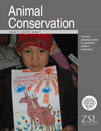
ANIMAL CONSERVATION
Preserving Nature's Legacy, One Study at a Time.Animal Conservation is a prestigious journal that serves as a vital platform for the dissemination of research dedicated to the preservation of wildlife and habitats. Published by Wiley, this journal has established a significant presence in the fields of Ecology and Nature and Landscape Conservation, holding a distinguished Q1 category ranking for both in 2023. With an impressive Scopus rank of #25 in the realm of environmental science, it caters to a global audience keen on understanding and addressing pressing conservation issues. The journal provides researchers, professionals, and students with high-quality, peer-reviewed articles that explore innovative methods and strategies in animal conservation. With its continuous publication since 1998, encompassing a comprehensive range of topics, Animal Conservation is indispensable for anyone aiming to make impactful contributions to the field of ecology and conservation biology.
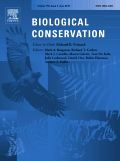
BIOLOGICAL CONSERVATION
Empowering Conservation Through Cutting-Edge Research.BIOLOGICAL CONSERVATION, published by Elsevier Science Ltd, is a leading international journal dedicated to advancing the science and practice of biological conservation. Since its inception in 1968, the journal has provided a critical platform for researchers, professionals, and students in the fields of Ecology, Evolution, Behavior, and Systematics as well as Nature and Landscape Conservation. With an impressive impact factor, and ranked in the Q1 category within both ecological and conservation domains in 2023, it emphasizes high-quality empirical and theoretical research essential for understanding and addressing pressing environmental challenges. Although it follows a subscription model, the journal is known for its rigorous peer-reviewed articles that contribute significantly to the field, ensuring that the latest findings and methodologies are readily accessible to practitioners. As a vital resource for those engaged in conservation efforts globally, BIOLOGICAL CONSERVATION stands out for its commitment to enhancing knowledge and informing strategies that safeguard biodiversity across ecosystems.
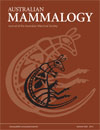
AUSTRALIAN MAMMALOGY
Championing Insights into Australia’s Diverse Mammal SpeciesAustralian Mammalogy, published by CSIRO PUBLISHING, is a pivotal journal in the fields of Animal Science and Zoology as well as Ecology, Evolution, Behavior and Systematics. With its ISSN 0310-0049 and E-ISSN 1836-7402, this esteemed journal has been instrumental in disseminating critical research findings since 2000, and continues to evolve up to 2024. Ranked in the Q2 quartile of both its categories for 2023, it showcases a diverse array of studies that contribute to understanding Australia’s unique mammalian fauna and its ecological dynamics. Researchers, professionals, and students will find valuable insights in its peer-reviewed articles, which are essential for advancing knowledge in these essential scientific disciplines. Located in Australia at UNIPARK, Locked Bag 10, Clayton, VIC, this journal remains committed to fostering scholarly communication within the global scientific community.
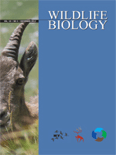
WILDLIFE BIOLOGY
Leading the way in ecological research and wildlife preservation.WILDLIFE BIOLOGY is a prestigious open-access journal published by WILEY, dedicated to the dissemination of high-quality research in the fields of ecology, evolution, behavior, and conservation. With an impressive Impact Factor indicative of its scholarly relevance, the journal has been a cornerstone for researchers since its inception in 1995, now extending its convergence through 2024. Recognized within the top Q1 and Q2 quartiles across various categories—including Ecology, Evolution, Behavior and Systematics and Management, Monitoring, Policy and Law—this journal plays a crucial role in fostering knowledge and promoting effective solutions in wildlife biology. The journal serves a diverse audience, offering robust access options since 2014, ensuring that vital research is freely available to professionals, researchers, and students alike. With its base in Denmark, the journal encourages contributions that address pressing wildlife management issues and informs policy development, further cementing its significance in the ecological research community.
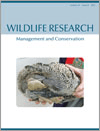
WILDLIFE RESEARCH
Advancing the Science of Wildlife ConservationWILDLIFE RESEARCH is a leading journal dedicated to the rigorous study of wildlife ecology and management, published by CSIRO PUBLISHING in Australia. With a notable ISSN of 1035-3712 and an E-ISSN of 1448-5494, this prestigious journal has been at the forefront of advancing knowledge in the fields of ecology, evolution, behavior, and systems since its inception in 1974. Spanning over four decades, WILDLIFE RESEARCH has established itself as a Q1 journal in Ecology, Evolution, Behavior and Systematics and Q2 in Management, Monitoring, Policy and Law as of 2023, indicating its substantial impact and relevance in these critical areas. It ranks impressively in Scopus, with scores in the 72nd and 58th percentiles respectively for its categories, reflecting its commitment to high-quality research. The journal does not offer open access options, but it provides valuable insights for researchers, professionals, and students aiming to contribute to wildlife conservation and management practices. As it approaches its 50th year, WILDLIFE RESEARCH continues to play an essential role in shaping the discourse around environmental science, policy, and biodiversity conservation in the global landscape.

WILDLIFE SOCIETY BULLETIN
Elevating the dialogue on wildlife management challenges.WILDLIFE SOCIETY BULLETIN is a premier publication in the field of wildlife management and conservation, published by Wiley. With an ISSN of 2328-5540, it serves as an essential resource for researchers, professionals, and students invested in advancing knowledge related to wildlife ecology, behavior, and conservation practices. Although currently not open access, the journal provides a platform for high-impact research and critical insights that contribute to the sustainable management of wildlife and their habitats. The WILDLIFE SOCIETY BULLETIN aims to foster interdisciplinary discussions and provide a vital connection between academia and practical applications, ultimately promoting a deeper understanding of wildlife conservation challenges and solutions. Located at 111 River St, Hoboken, NJ, it continues to be influential in disseminating significant findings that shape policies and practices in wildlife stewardship.
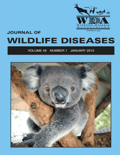
JOURNAL OF WILDLIFE DISEASES
Innovating insights into wildlife diseases and their ecological impacts.JOURNAL OF WILDLIFE DISEASES, published by the WILDLIFE DISEASE ASSOCIATION, INC, is a premier, peer-reviewed journal dedicated to advancing the understanding of wildlife diseases and their implications for ecosystems and public health. Since its inception in 1970, this journal has served as a crucial platform for researchers and professionals within the fields of ecology and wildlife management, currently maintaining a credible Q2 ranking in Ecology and a Q3 ranking in Ecology, Evolution, Behavior and Systematics as of 2023. With an ISSN of 0090-3558 and an E-ISSN of 1943-3700, the journal encompasses a wide range of topics, from disease dynamics to the conservation of wildlife populations. This journal is recognized for its valuable contributions to the ecological and environmental sciences, supporting evidence-based approaches to wildlife management. While it does not offer open access, the JOURNAL OF WILDLIFE DISEASES continues to impact the scientific community and policy-making through its rigorous publications. As such, it remains an essential resource for those committed to understanding and addressing the complex challenges of wildlife health.

Journal of Wildlife and Biodiversity
Advancing knowledge in wildlife conservation.Journal of Wildlife and Biodiversity, published by Arak University in Iran, is an Open Access journal that has been contributing to the fields of wildlife science and biodiversity since its inception in 2017. With an E-ISSN of 2588-3526, this journal serves as a vital platform for researchers, professionals, and students alike, dedicated to disseminating significant findings related to animal sciences, ecology, and environmental conservation. Despite its current Q4 ranking in various categories (Animal Science, Ecology, and Nature and Landscape Conservation) according to the 2023 metrics, the journal's commitment to advancing knowledge in wildlife and biodiversity remains unwavering. Although the journal's Scopus coverage has been discontinued since 2024, it continues to cater to a wide audience by promoting innovative research and fostering collaborations in the academic community, ultimately aiming to enhance understanding and conservation strategies for wildlife and their habitats.
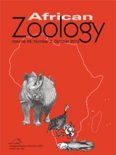
AFRICAN ZOOLOGY
Advancing Knowledge in Animal ScienceAFRICAN ZOOLOGY, published by Taylor & Francis Ltd, stands as a significant journal in the realm of Animal Science and Zoology, with a proud history dating back to 1996 and slated to continue until 2024. With an ISSN of 1562-7020 and E-ISSN 2224-073X, this journal provides a reputable platform for researchers and practitioners dedicated to the study of animal biology across the African continent. It has been recognized for its quality scholarship, evidenced by its Q3 categorization in the 2023 Scopus quartile rankings and an impressive rank of #182 out of 490 within its field. As an open-access journal, it facilitates the dissemination of vital research findings and promotes broader accessibility, catering to a diverse audience of professionals, scholars, and students alike. The journal aims to enhance our understanding of wildlife, conservation, and ecosystem dynamics in Africa, fostering collaborations that address critical ecological challenges. For researchers and enthusiasts keen on contributing to and staying informed about advancements in zoological science, AFRICAN ZOOLOGY is an essential resource that enriches the global discourse on biodiversity and conservation efforts.